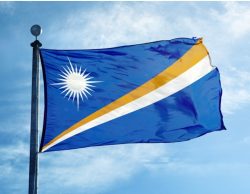
Adults who were born in the Marshall Islands can now obtain Medicaid coverage in Arkansas, ending a decades-old injustice that exacerbated already persistent health disparities.
Today (February 23), a legislative review committee approved an administrative rule that changes the wording of the state’s Medicaid policy manual. It makes clear that adults born in Compact of Free Association nations, including the Marshall Islands, are no longer excluded from the program. This confirms that Arkansas will abide by a new federal law approved late last year. The most recent coronavirus relief package, signed into law on December 27, 2020, gave Marshallese migrants Medicaid eligibility for the first time since 1996.
All Arkansas had to do was make its eligibility rules conform to the new law, and the rule change today did that. As a result, Marshallese-born adults who live in Arkansas will be able to begin signing up early next week for Medicaid coverage if they meet the program’s other requirements, including income limits. The coverage will be retroactive to the end of December, when the federal law went into effect. That means that if newly eligible people incurred health expenses during the past couple of months, those expenses might be covered by this new insurance.
More information on Medicaid eligibility and how to apply is available on the Department of Human Services website here. In addition, Arkansas Coalition of Marshallese and Marshallese Educational Initiative are working with DHS and have some capacity to help people enroll. In the first few weeks, the Marshallese-translated information will be available for paper applications only. An online form should be available later in the spring.
It was a long road to get here, one that Arkansas Advocates for Children and Families and our partner organizations have been working toward for many years. Alongside Marshallese advocates, we have long argued that it was a mistake to leave them out of Medicaid coverage, because they are lawfully residing in the United States. The mistake was included as part of federal “welfare reform,” in part because Marshallese migrants’ residency status is more complicated than most. But it shouldn’t have taken 25 years to fix it.
Marshallese migrants are free to come and go and live and work here under the previously mentioned Compact of Free Association with the United States. It’s an international agreement between our government and three Pacific Island states, including the Republic of the Marshall Islands, which includes limited financial assistance and permission for U.S. armed forces to maintain operations in the islands.
It’s also an acknowledgement of the United States’ failure to address the impacts of decades of nuclear testing in the Marshall Islands, which left some areas uninhabitable and created devastating health impacts for communities there. The United States detonated 67 nuclear weapons off the coast of the Marshall Islands, including the largest nuclear weapon our government ever tested. Castle Bravo, as it was called, was 1,000 times more powerful than the bombs dropped on Japan at the end of World War II. The anniversary of the detonation is March 1, which is commemorated in the Marshall Islands as nuclear Remembrance Day, a national holiday.
For these reasons and so many more, but especially because Marshallese Arkansans are an integral part of our state and local communities, we are grateful for the change in federal law and for today’s Medicaid rule change at the state level. It’s about time.
